
Winslow Cattle Market
by Ed Grimsdale
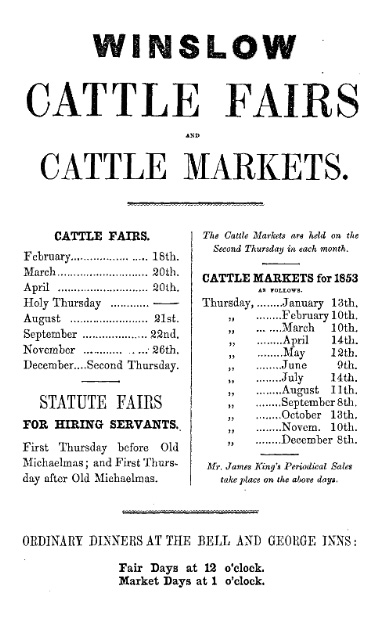 Winslow cattle market thrived for many centuries and lasted into the 21st century unlike the livestock market in neighbouring Buckingham. Originally, the cattle markets were held in the Market Square itself. Have a look at the advertisement from a trade directory of 1853 (right) and you’ll see that Market Ordinary Dinners were held at the adjacent Bell and George Inns from noon. Most of the trade would have ended by lunch but farmers would give their sticks to local lads who would keep an eye on the penned animals whilst their owner supped. The writer’s uncle, Henry Grimsdale, tells of performing such a role in the Aylesbury Cattle Market during the 1930s. The grateful yeoman farmer would return full of ale and victuals and award Henry sixpence. Do look again at the advert, perhaps at the section reminding customers that before and after Old Michaelmas [10 October], they could hire servants (and runaways). How appalling that in our country which abolished slavery in 1833, servants remained twenty years later as chattels and little more than an “h” and a reordering of letters away from cattle in terms of their public treatment.
Winslow cattle market thrived for many centuries and lasted into the 21st century unlike the livestock market in neighbouring Buckingham. Originally, the cattle markets were held in the Market Square itself. Have a look at the advertisement from a trade directory of 1853 (right) and you’ll see that Market Ordinary Dinners were held at the adjacent Bell and George Inns from noon. Most of the trade would have ended by lunch but farmers would give their sticks to local lads who would keep an eye on the penned animals whilst their owner supped. The writer’s uncle, Henry Grimsdale, tells of performing such a role in the Aylesbury Cattle Market during the 1930s. The grateful yeoman farmer would return full of ale and victuals and award Henry sixpence. Do look again at the advert, perhaps at the section reminding customers that before and after Old Michaelmas [10 October], they could hire servants (and runaways). How appalling that in our country which abolished slavery in 1833, servants remained twenty years later as chattels and little more than an “h” and a reordering of letters away from cattle in terms of their public treatment.
Winslow was evidently prospering as a market centre in the first part of the 19th century. New fairs were instigated on 26 Nov 1823 and 18 Feb 1824, to be held annually, and more were added in 1829:
Oxford Journal, 18 April 1829
TWO NEW FAIRS AT WINSLOW
AT the earnest request of many Dealers, Graziers, Dairymen, and others, that Two additional FAIRS be held in WINSLOW, (and which request having been sanctioned by William Selby Lowndes, Esq. Lord of the said Manor), Notice is hereby given, That the first will be held on the 20th day of APRIL inst. And the other on the 9th of DECEMBER annually – It is arranged for the country beasts to be pitched in the High-Street Winslow, April 9, 1829
Once the turnpike to Buckingham was completed in the 18th century, traffic through the Market Square increased rapidly and the trend was exacerbated when steam & internal combustion engine machines appeared on the roads of North Bucks. Fast traffic and plodding beasts were an unfortunate combination so the Cattle Market moved in 1875 to Wigley’s Yard, owned by a family of local auctioneers [see below]. It wasn’t far away from Winslow Market Square and it was still connected to Horn Street and not far from Sheep Street, themselves reminders of a past when the transport of beasts to and from market were vital to Winslow’s economy. Permanent buildings are shown on the site in the 1899 Ordnance Survey map (but not in 1885).
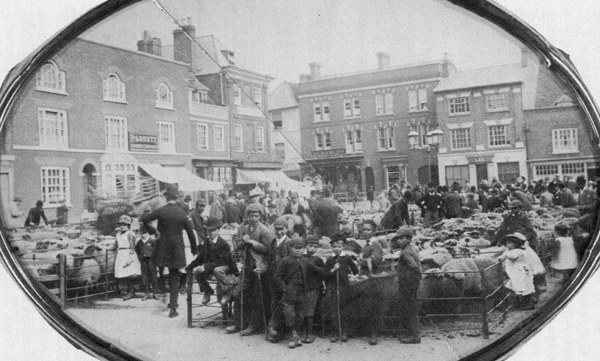
The annual Sheep Fair was held in September from 1886 (see below). The photo shows one on the Market Square c.1896. The Christmas Primestock Show returned to the Market Square in December 2014.
In 1850, immediately after the Station opened, James King established his own regular sales, taking advantage of "the facility and cheapness of transit afforded by the Buckinghamshire Railway".
Market day in Winslow was Thursday from the 13th century until:
Bucks Herald, 7 Aug 1858
WINSLOW MARKET AND FAIRS.
ALTERATION OF MARKET DAY TO WEDNESDAY.
At a numerous PUBLIC MEETING held this day, at the BELL INN, WINSLOW, it was unanimously Resolved, with the approbation of the Lord of the Manor, that on and after WEDNESDAY, the 11th of AUGUST next, the MARKET should be held on WEDNESDAY in every Week, instead of THURSDAY.
Also, that the HOLY THURSDAY FAIR be altered to the THIRD WEDNESDAY in MAY; that the STATUTE FAIRS be held on the WEDNESDAY before and the WEDNESDAY after the 11th of OCTOBER; and that the DECEMBER FAIR be held on the SECOND WEDNESDAY in DECEMBER.
DAVID THOMAS WILLIS,
Chairman.
Winslow, 15th July, 1858.
Winslow market closed at the end of 2007 but re-opened as “Winslow Market” at Foscote on land belonging to the Pullin family, a few weeks later in 2008 (now defunct). Wigley’s yard was sold for development, much to the dismay of many locals.
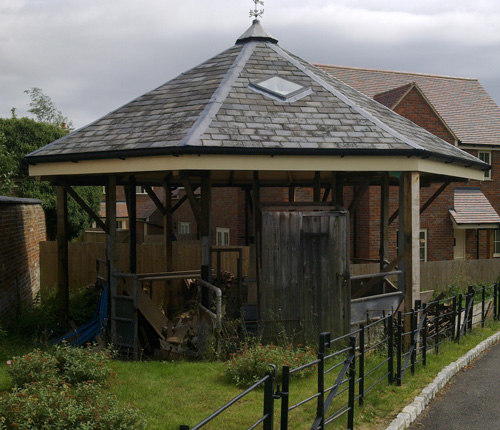 |
Only the auction ring, built between 1899 and 1925, remains (shown in 2011) from the site of the Cattle Market, retained as a planning condition. The new houses have been named Limes Court after the lime trees which have been on the site at least since the 1885 Ordnance Survey map. |
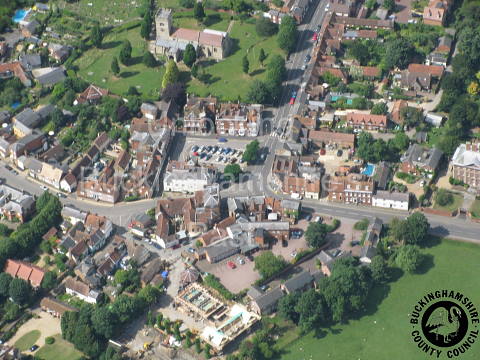 |
This aerial photograph (© Michael Farley, used with permission) shows building work in progress on the former cattle market at the bottom of the picture. |
The first record of a market being held on what appears to be this site comes from the Bucks Herald, 4 Nov 1865 (the reference to an Inspector is due to an outbreak of rinderpest):
W I N S L O W
NOVEMBER MONTHLY SALE
Will be held in the FIELD OF THE AUCTIONEERS,
HORN STREET, WINSLOW.
(Instead of the usual place in the High Street,)
On WEDNESDAY the 8th of NOVEMBER, 1865,
Commencing at One o’Clock and will comprise
FIVE HUNDRED FAT SHEEP AND STORE TEGS, 20 FAT BEASTS, and 60 BACON HOGS and PORKETS, when none but Healthy Stock will be admitted.
JOHN & JAMES KING,
AUCTIONEERS, WINSLOW.
ALL STOCK will be subject to the Inspection of the Inspector appointed by the Magistrates for the Division.
A DINNER will be provided at the GEORGE INN, WINSLOW, at Half-past 12 o’Clock, at 2s. each; to be returned to Purchasers and senders of Stock for Sale.
The market was then suspended because of the cattle disease, and when it resumed on 9 May 1866 it was advertised as being in the High Street, where it continued during the following years.
The King brothers held a market in the High Street and the Dudleys had one in Sheep Street. In 1867 new arrangements were put in place to revive trade after the rinderpest and James King's financial problems, presumably on the Market Square, as the following reports and notices show. By August there seem to have been three separate sales being held on the same day.
1867: Bucks Herald, 16 March
ESTABLISHMENT OF A CATTLE MARKET.- A numerous and influential meeting was held at the Bell Hotel on Wednesday, the 13th inst., when it was unanimously resolved to establish a cattle market at Winslow, as will be seen by our advertizing columns, on the 1st and 3rd Wednesdays in each month. A committee, Mr. Monk being appointed chairman, was formed for carrying this desirable object into effect, and William Selby Lowndes, Esq., Lord of the Manor, kindly consented to allow the markets to be held toll free, thus carrying out a great principle by doing away with such useless trammels to freedom of trade. From the parties who have taken an interest in this movement we may justly expect that it will be brought to a successful result.
WINSLOW CATTLE MARKET.
TO CATTLE DEALERS, GRAZIERS, & OTHERS.
CATTLE MARKETS
(TOLL FREE)
WILL be held at WINSLOW on the FIRST and THIRD WEDNESDAYS in each MONTH.
THE FIRST MARKET will be held on WEDNESDAY, APRIL 3rd, AT 9 O’Clock in the Morning.
(Signed) HENRY MONK,
Chairman of the Committee.
March 14th, 1867.
1867: Bucks Chronicle, 13 April
THE CATTLE MARKET ON Wednesday week was well attended by farmers and dealers. There was a large show of down-calving heifers and barren cows, as well as young store stock, for which the trade was very brisk at enhanced prices. Fat beef and mutton also sold very readily. London cows, store tegs, and couples were in full supply; they changed owners at lower quotations, but a good amount of business was done, the general feeling being that a good fortnightly market would be well supported. After dinner, at the Bell and the George Hotels, the health of W. Selby Lowndes, Esq., Lord of the Manor, was proposed, and heartily responded to with “Three times three,” in acknowledgement of his liberality in giving up the tolls for the good of the town and neighbourhood of Winslow. The next market will be held on Wednesday, the 17th inst., when a large attendance is expected.
1867: Bucks Herald, 27 April
THE MARKET.- We understand that it is the intention of the farmers and dealers attending Winslow Cattle Market, to present a piece of plate of the value £50 to William Selby Lowndes, Esq., Lord of the Manor, for his kindness in allowing the market to be held “toll free,” and likewise a piece of plate to Edward W. S. Lowndes, Esq., of Winslow Lodge, for the very courteous manner in which he has granted passes for the removal of cattle.
1867: Bucks Herald, 27 July
WINSLOW CATTLE MARKETS.
Messrs. DUDLEY & SON
RESPECTFULLY inform the Public, that in compliance with the wishes of many of their Friends and for the convenience of their Customers generally, they have resolved on holding FORTNIGHTLY SALES OF STOCK, taking place on the FIRST and THIRD WEDNESDAYS of the MONTH, simultaneously with the Newly Established Cattle Markets.
Winslow, July, 1867.
1867: Bucks Herald, 17 Aug
WINSLOW CATTLE MARKETS.
AUGUST SALE,
Mr. JAMES KING
W I L L S E L L B Y A U C T I O N,
On WEDNESDAY, 21st AUGUST, 1867,
In the High Street, Winslow, at One o’Clock,
ABOUT 250 SHEEP AND LAMBS, comprising Fat Lambs, Ewes, and Wethers, and Store Shearhogs and Lambs; 40 FAT HOGS, Porkets, and Store Pigs; and a few Fat Cows, Heifers, and Sturks.
1868: Leighton Buzzard Observer, 27 Oct
ABOLITION OF THE FAIRS.- We are informed that the fairs of Winslow are now done away with, and that they are substituted by large markets, held the first and third Wednesday in each month.
1871: Dudley v Stonhill
This dispute about the purchase of some pigs throws much light on Dudleys' sales in Sheep Street.
James King was bankrupt again in 1874, and his market was taken over by a firm from Buckingham (presumably still in the High Street):
1874: Buckingham Advertiser, 31 Jan
Messrs. HARRISON & SON,
WILL hold a SALE by auction, in WINSLOW Cattle Market on Wednesday next, FEBRUARY 4, 1874, at 2 o’clock.
Entries of Fat and Store Stock for Sale respectfully requested.
Particulars may be sent prior to the Sale to Mr. J. King Jun., Horn Street, Winslow, or on the Sale morning to the Auctioneers, at the King’s Head Inn, Winslow.
George Wigley, who previously worked for S.B. Dudley, bought James King's house (now Lawn House) and established a new market on the adjacent land, the site which became known as the Cattle Market.
1874: Bucks Herald, 6 Dec
By Mr. GEORGE WIGLEY.
WIGLEY’S SALE YARD,
WINSLOW MARKET.
WEDNESDAY, JANUARY 6th, 1875.
FAT HALF-BRED WETHERS & EWES, FAT WELSH WETHERS, STORE EWES and TEGS, some PRIME FAT HOME-BRED OXEN and HEIFERS, DOWN-CALVING and BARREN COWS, SHORTHORN HEIFERS and STEERS. Also 10 IN-CALF SHORTHORN COWS and HEIFERS (the Surplus Stock of a Gentleman in the Neighbourhood); 100 BACON HOGS, PORKETS and STORE PIGS,
TO BE SOLD BY AUCTION, BY Mr. GEO. WIGLEY,
IN HIS SALE YARD, near the Bell Hotel, Winslow, commencing with the Sheep at half-past 10 for 11 punctually.
Further Particulars may be obtained of the Auctioneer, Winslow.
1874: Bucks Herald, 6 Dec
WINSLOW FAIR.
TO THE EDITOR OF THE BUCKS HERALD.
SIR - Repeated announcements of fairs at Winslow have caused inconvenience to many people. Allow me therefore to explain that since the importation of the cattle plague in 1865 all the fairs at Winslow have been discontinued, and a bi-monthly market holden on the 1st and 3rd Wednesdays in the month has been established in their stead. This market has become of considerable local importance, mainly through the liberality of Mr. Lowndes, the Lord of the Manor, in making it toll free, an example worthy of imitation in some other places which I could name.
Whilst on the subject of fairs, permit me also to urge a much-needed alteration in those only lasting a single day, namely, that they should be held in market towns on the usual market day.
I am, Sir, yours obediently,
JOHN WALLER.
Home Cattle Defence Association,
Luton, December 3rd, 1874.
The following account of the history of the market in the 19th century comes from Alan Wigley, A Window on Winslow (1981), pp.108-9:
In January 1870, Dudley & Son, who had been established in Winslow for a considerable number of years, and at the latest 1815, opened a market on alternate Wednesdays in a yard adjoining the Nags Head in Sheep Street. In December of that year they held a Christmas show on the same premises. The following year 1871 some prime cattle for Christmas were included in the fortnightly sale. Records from the Bucks Express show that at that time the fortnightly sales on the Market Square had lapsed. The 4th February 1874 saw the re-introduction of sales on the Square. Harrison & Son, who had a business in Buckingham, where they also ran the market, again opened up the livestock market on the first and third Wednesdays in the month. So for a period, there were two livestock markets which from time to time coincided on a Wednesday. Harrisons office was at the Kings Head Inn, in the High Street. This venture did not flourish, and the Market Square sales ceased at the end of 1874. However further competition came to Dudley & Son following the death of the son. George Wigley, who had run the agricultural side of the business for a number of years, broke away to inaugurate a market on the present site. On 6th January 1875, the first market was held. Two Christmas shows were held that year. One by George Wigley at 11.30 in the present market and the other, with typical agricultural timing was scheduled for 12 noon for 1 o'clock at Dudleys premises in Sheep Street. There was no sale on the Market Square. This pattern of marketing continued until the end of 1881, when Dudleys closed their premises in Sheep Street. One market only continued until the next revision of arrangements, which was the moving of the Market Day to Mondays in 1887. Complaints over the condition of the Square, which belonged to the Lord of the Manor, William Selby Lowndes, were received from the Board of Agriculture as the result of which, the Christmas Shows for 1889-1894 reverted to the Market sale yard. During this period other developments had taken place. A meeting was convened at the Bell Hotel on the 11th August 1886, attended by a number of local farmers, the descendants of some whom continue to farm in the area. It was resolved to hold an open Fat Stock Show that year. The elected President was W.G. Lowndes and the secretary G.D.E. Wigley. A committee formed at that initial meeting resolved to hold the 1888 show on the Square, and to hold a public dinner at the Bell Hotel at 4.30 in the afternoon. November 1895 produced complications when W. Selby Lowndes offered to sell his rights on the Market Square to the Parish Council. A meeting of that Council agreed in December not to accept the offer until the Square was put in order. An appeal was made to the town in 1897, organised by William Neal. A further appeal for £110 to meet the finishing work was made in 1898. Continuing the endeavour to preserve the Square for livestock sales, the Fat Stock Exhibitions of 1895-97 were held there, but the sales were held in the market. From 1898 onwards, no further shows or sales took place on the Square; following the resolution of a show meeting on the 5th October of that year, and it must be assumed that sufficient funds were not forthcoming to complete the repairs to the Square. |
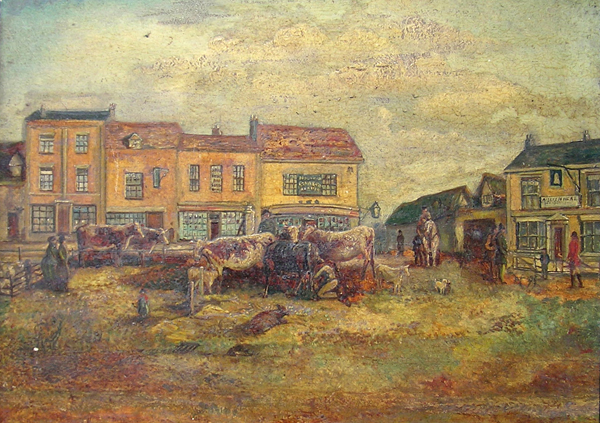 It seems that the dates given by Mr Wigley are not quite correct, as this painting of the cattle market on the Market Square (right) is dated 6 Jan 1875. The following entries in the Bucks Herald show what happened:
It seems that the dates given by Mr Wigley are not quite correct, as this painting of the cattle market on the Market Square (right) is dated 6 Jan 1875. The following entries in the Bucks Herald show what happened:
Sat 2 Jan 1875
Wednesday:
Fortnightly Sale of Fat & Store Stock, in Winslow Market, by Messrs Dudley & Son.
Fortnightly Sale of Fat & Store Stock, In Winslow Market, by Mr. Geo. Wigley.
Sale of Stock, in Winslow Market, by Messrs Harrison & Son.
This notice was repeated on 16 Jan, but there were two separate adverts:
By Mr Geo. WIGLEY
WIGLEY'S SALE YARD
WINSLOW MARKET
WEDNESDAY, JANUARY 20th, 1875
FAT and STORE SHEEP including FAT WETHERS and EWES, IN-LAMB EWES AND TEGS; PRIME FAT HOME-BRED OXEN and HEIFERS, DOWN-CALVING & BARREN COWS; 120 FAT HOGS, PORKETS, and STORE PIGS
TO BE SOLD BY AUCTION, BY
MR. GEO. WIGLEY
IN HIS SALE YARD, near the Bell Hotel, Winslow, commencing with the Sheep at half-past 10 for 11 punctually.
By Messrs DUDLEY & SON
WINSLOW FORTNIGHTLY SALE
WEDNESDAY, JANUARY 20th, 1875
120 SHEEP, comprising FAT WETHERS, EWES AND TEGS, STORE TEGS
and EWES, 16 FAT HOME-BRED and HEREFORD OXEN and HEIFERS, DOWN-CALVING COWS, STURKS, and STEERS; FAT HOGS, PORKETS and STORE PIGS
TO BE SOLD BY AUCTION, BY DUDLEY & SON
In their SALE YARD, SHEEP STREET, WINSLOW, Commencing at Half-past Eleven o'Clock to a minute.
All Stock should be in the Yard by 10 o'Clock.
It appears that the painting represents (perhaps after the event) the last regular livestock market on the Market Square, before Dudleys and Wigleys moved to their separate premises on 20 Jan 1875. The photo below from c.1900 shows the aftermath of one of the occasional fairs which continued to be held there.
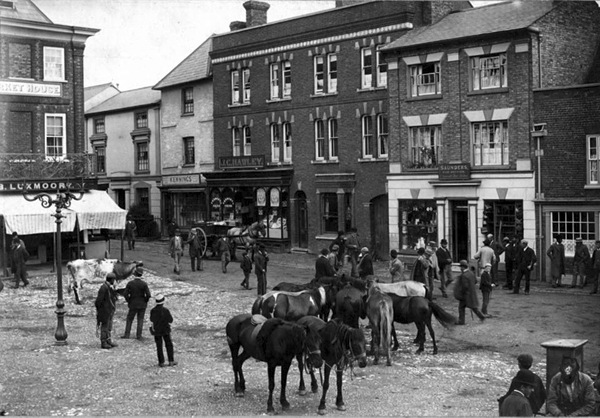
G.D.E. Wigley started an annual Sheep Fair in 1886 (Buckingham Advertiser, 18 Sep):
Winslow Sheep Fair.
Winslow is to be congratulated upon the success of its first sheep fair on Wednesday, and undoubtedly it will be made an annual affair. Mr. George Wigley, its enterprising and popular auctioneer, announced by advertisement that the sale would comprise some 500 head of sheep; but it was found that this number was more than doubled, and no less than 1,250 head were penned in the Market Square and in Mr. Wigley’s sale-yard. Winslow market is certainly one of the best in the neighbourhood, and on this day the attendance was very large. Mr. Wigley commenced selling at half-past 10 o’clock, and it was nearing 5 o’clock ere he reached the end of the long day’s list...
The 1889 Sheep Fair dealt with 1,050 sheep and lambs and seems to have been held entirely in the sale yard (Buckingham Advertiser, 21 Sep).
Markets were disrupted by periodic outbreaks of disease such as this one (Bicester Herald, 22 July 1887):
SWINE FEVER AT WINSLOW.- In consequence of an outbreak on the premises of Mr. G. Dunkley, the town of Winslow is declared an infected area, and notice is given that Wednesday’s pig market will be held at Shipton.
The sale yard provided extra facilities for Winslow (Bucks Herald, 9 Nov 1889):
THE FIFTH OF NOVEMBER.- The observance of “The Fifth” is almost obsolete in this town. The principal feature now consists of wearing of masks by youths, from whence it has got to be called Mask-day. Mr George Wigley invited the scholars of Brook Hall and Arundel House to witness the large bonfire, fireworks, &c., which are annually kindled in his sale-yard.
1891: Buckingham Advertiser, 14 Nov: Board of Guaridans
MARKET DAY AND THE SCHOLARS.- Mr. Collier [school attendance officer] said that it was the rule for about a dozen lads to be absent from school on market days at Winslow. The lads were employed to attend to the cattle and sheep. He had selected a test case which was that of George Viccars, aged 9 years, son of Alfred Viccars; the school was open ten times and the lad was absent 3 times. The lad had passed the First Standard. He had been to the parents of the lads, and had spoken to Mrs. Viccars twice about her boy. He had been in the market and sent the boys off to school. The boys would not tell him who set them to mind the cattle and sheep. What he asked for were instructions to check this habitual absence of the lads on market days, or else at the end of the year it would be found that the fee-grant would be considerably reduced.- It was decided that he should give a final notice to the whole of the parents whose lads were absent on market-days, and warn them that if the lads were caught minding the cattle and sheep again in school hours, the parents would be summoned.- The Chairman remarked that it was hard now that the education was free and parents should not send their children to school, so that they could receive a good education. If the children did not go to school, it would not only be a loss to the children, but also to the funds of the school.
There was a detailed report on the state of the livestock markets at the Parish Council meeting in April 1896, followed by prolonged debate about what to do about holding them on the Market Square, which the Board of Agriculture had deemed unsuitable. This led to the following:
1896: Buckingham Advertiser, 5 Dec
CATTLE MARKET.
A meeting of the inhabitants of Winslow interested in its fortnightly cattle market was held at the Bell Hotel, Winslow, on November 16. Amongst those present were Mr. Geo. Wigley, who presided, Mr. T. P. Willis, Mr. H. Bullock, Messrs. J. Varney, John Ingram, T. Walker, F. Loffler, W. S. Neal, W. Monk, G. A. Monk, T. Curtis, G. Midgley, T. Saunders, G. George, A. Warr, E. A. Illing, G. W. Bull, Sturgess, W. H. Stevens, and H. J. Russell.
The chairman impressed upon the meeting that it would be a most disastrous thing for Winslow and the neighbourhood to lose its old established and successful cattle market, in which the whole of the meeting acquiesced, and were of opinion that every effort should be made to prevent its being closed…
The following resolution being proposed and carried unanimously:-
“That this meeting is of opinion that all things considered, the space under the Churchyard wall, part of the pebble portion adjoining the Market Square lamp, and the spaces adjoining the Bell Hotel premises and home close, are the best adapted for market purposes, that the County Council be asked if they will contribute towards the expense of asphalting the ground in question, and that the further cost of carrying out the necessary work be raised by voluntary subscriptions, and further that a copy of this resolution be forwarded to the leading local members of the Highway Committee.”
An influential committee was appointed to carry the matter out.
1896: Buckingham Advertiser, 26 Dec
WINSLOW MARKET.- A meeting of the Committee appointed to take this matter in hand, was held at the Bell Hotel, on Wednesday in last week, and was well attended, amongst those present being the Hon. T. F. Fremantle, C.C. Major Landon, one of the Board of Agriculture Inspectors, was also present. The principal business was the reading of a letter from the County Council expressing regret at their inability to help in the asphalting of the ground for the market. It was felt that Winslow being the centre of a groups of villages, the loss of its market would be a calamity to the town, as well as to the whole of the agricultural and landed interest throughout the district, and that no other course being open, it would be best to raise the funds for the paving of the market by voluntary contributions, and the following Committee were appointed for the purpose:- Messrs. T. P. Willis, H. Bullock, G. R. Greaves, W. Weston, Jno. Linnell, Thos. Biggs, A. Monk, H. Brazier, G. W. Bull, E. H. Baylis, W. Hedges, W. Hinton, C. Colgrove, W. J. Viccars, A. Warr, Jno. Ingram, G. George, E. A. Illing, Geo. Wigley and W. S. Neal, hon.sec.
The committee was successful in raising the funds. Read more.
1898: Bucks Herald, 15 Oct: Winslow Petty Sessions
OBSTRUCTING THE HIGHWAY.- Frank Stroud, a youth, was charged with obstructing the footway at Winslow by allowing sheep to be on it for thirty minutes, on Oct. 5th.- P.S. Trevener said he saw about 100 Scotch lambs lying on the footpath close to Mrs. Newcombe’s house in Horn Street. The footpath was completely obstructed, and foot passengers had to go out into the road. In consequence of a complaint by Mrs. Newcombe’s coachman, witness went with him to the defendant, and asked why he did not move the lambs when he was told to do so. Defendant said he had nowhere else to put them. Witness told him there was plenty of room on the Market-square, and he must shift them. He then did so.- Defendant said the Market-square was full of cattle and calves, and there were no sheep pens, so he took them to Mrs Newcombe’s, as there was no room elsewhere.- Mr. J. Cutler, dealer, said it was market-day, and they must pitch the sheep somewhere in the town. He had 500 sheep at Leighton the same day.- Mr. Willis, magistrates’ clerk said the Board of Agriculture had compelled the asphalting of the market-place, and would not allow cattle to be put in other places. They inflicted a fine of 1s. and 5s. 6d. costs.- Mr. Cutler paid the money, and said he thought it was a cruel thing. He had never heard of its being done at any other market.
1899: Bucks Herald, 16 Sep: Winslow Petty Sessions
OBSTRUCTING THE FOOTPATH.- Mr. Arthur Warr of Addington, farmer, was charged with allowing two cows and two calves to obstruct the highway at Winslow. – P.S. Trevenor said on Sept. 6, at 11.30 a.m., he saw two cows and two calves on the footpath in the Market-square, Winslow. The two calves were lying close to Mrs. Starkey’s front door [13 Market Square], and the two cows were standing on the footpath close to her window. Witness saw them there from 11 to 11.30, and there was no one in charge of them. He got a drover to remove them on to the square. The footpath was completely obstructed, and foot-passengers had to turn off… Complaints had been made of the obstructing of these footpaths by shopkeepers and others, who said they got nothing but abuse when they complained to the men in charge.- P.C. Knibbs gave corroborative evidence, and said he saw three women obliged to turn off the path because of these cows and calves.- Mr. Warr said the cows were sold and were going to Ledburn Manor, so that practically they were gone out of his possession, and the two men were waiting to take them away. This was the first time he had put his cattle on the Market-square, as he usually put them under the churchyard wall…
1899: Buckingham Advertiser, 23 Sep
The annual sheep fair was held on Winslow Market Square on Wednesday, and was the largest that has been known for some time, about 15,000 passing through Mr. Wigley’s auction. Trade for anything of a useful quality was satisfactory considering the season, but for sheep of inferior quality trade was slow…
1905: Buckingham Advertiser, 1 July
Winslow was honoured with its first wool-fair on Friday last, when the pitch was an exceedingly large one, amounting to over 4,000 fleeces, and Messrs. Geo. Wigley and Sons are to be congratulated upon the result of their effort to establish a wool fair for the town and district. It is probable the fair will become an annual one, in which case, undoubtedly, it will hold a good position amongst other local ones which have been established for many years. Nearly the whole of the wool was disposed of at satisfactory prices, the highest price being 30s. 6d. per tod, and the average about 28s. 6d. [1 tod = 28 lbs of wool]
1905: Bucks Herald, 9 Sep
WINSLOW ANNUAL SHEEP FAIR.- THE LARGEST ON RECORD.
The above fair was held on Wednesday, the entry exceeding all anticipations, over 2,000 sheep being penned as against 1,300 last year. From seven o’clock the pens rapidly filled, and the space usually occupied in the Market-square was soon occupied. The unprecedented entry evidently taxed the energies of the auctioneers (Messrs. Geo. Wigley and Sons) to the utmost, it being difficult to find accommodation as fast as the sheep were brought in; but eventually pens were found and to spare for all, many hundreds being accommodated in Mr. Wigley’s paddock and in the Cattle Mart adjoining. Fortunately the attendance of buyers from all parts was remarkably large, and the trade for theaves, ewes, and lambs was very brisk, the great majority changing hands at satisfactory prices. About 50 rams were also offered, nearly all being sold. There was a capital entry of fat sheep in the sale yard, and the biddings here appeared to be particularly brisk. About 50 beasts were also penned, but the trade for beef was slow; store beasts, however, selling better.
1906: Death of G.D.E. Wigley
1908: Buckingham Advertiser, 22 Feb
A very largely attended meeting of farmers and tradesmen interested in Winslow Market was held at the Bell Room on Wednesday afternoon to consider the desirability of holding it on alternate Wednesdays instead of on the first and third. Mr. W. R. Monk was voted to the chair, and among those present were Messrs. C. Colgrove, W. Hinton, F. W. Lester, H. H. Wigley, C. E. Watkins, Joseph Dickins, E. A. Illing, Jas. Illing, Edward Illing, G. George, W. S. Neal, S. D. Bird, Jno. Dickins, G. Hancock, Beckett, E. Sear, W. J. Watson (Bletchley), T. Adkins (Banbury), W. Chapman (Thornborough), W. King (Nash), T. D. Curtis, A. J. Clear, J. Buckingham, J. Varney, Faulkner, Wood, W. Wise, etc.
After some discussion the following resolution (which had been brought forward at the previous meeting) was proposed by Mr. H. H. Wigley:- “That in the interests of agriculture, the markets of Winslow be held fortnightly instead of on the first and third Wednesdays in the month, and so as not to clash with Fenny Stratford or Brackley.” Mr. Lester seconded.
Mr. Varney pointed out that at present people knew exactly which Wednesdays in the month the market was being held on, it being a fixture for the first and third. The question was, if altered, would they remember it.
Mr. Wigley said for one thing they advertised the auction sale in seven local papers, and that would let people know the date.
Mr. Watkins and Mr. Hancock expressed themselves in favour of the market being weekly, but this did not meet with any support.
Mr. Wigley added to this resolution- “That the market continue as it is till May 6, and from then be held every fortnight, and that the Fat Stock Show Committee be asked to carry this out and make it known.” This was carried unanimously.
On the suggestion of Mr. Neal, seconded by Mr. Joseph Dickins, it was decided to try and revive the open sheep market.
1910: Buckingham Advertiser, 10 Sep
SHEEP AND RAM FAIR.
The increasing importance of Messrs. Geo. Wigley and Sons’ yearly auction sale was strongly evidenced by the remarkable number of sheep penned at Wednesday’s sale, nearly 3,000 sheep in all passing through the auctioneers’ hands, many hundreds more than ever exhibited before, and judging by the fact that each year sees a decided increase on the previous years’ entries, and the remarkable number of buyers attending, the fixture seems an increasingly popular one with agriculturists.
The sale commenced at 11 o’clock, Mr. S. P. Wigley experiencing a somewhat slow trade to start with for the half-bred sheep, but more competition was exhibited for Oxford Down sheep, subsequently, however, nearly every pen was disposed of. Over 100 rams and ram lambs were subsequently offered and found ready purchasers, and apparently very few were taken back. Mr. Hanson’s shearlings, rams and ram lambs realised from 44s. to 74s.; Mr. W. Viccars’, from 46s. to 70s.; and Messrs. W. H. and F. C. Biggs’ western lambs everaged at £2 each.
While Mr. S. P. Wigley was disposing of the above, Mr. H. H. Wigley met with a good trade for several hundreds of fat sheep and lambs in the auction yard, fat lambs realising up to 40s., and wethers up to 54s.
1915 Assessment TNA, IR58/2349 no.323
Situation The Walk
Description Cattle Market with Office, Furniture store shed & cattle & sheep pens
Extent AC 1 - 0 - 33 RN
Gross Value: s £ 30 Rateable Value £ 24
Occupier Messrs SP & HH Wigley
Owner Geo Wigley & Sons Winslow
Interest of Owner Part Freehold & Part Copyhold of Manor of Winslow
Estimated Rent £20 - 25
Outgoings - Land Tax, £ may be included with 322
Who pays (a) Rates and Taxes (b) Insurance }Occupiers
Who is liable for repairs }
Fixed Charges, Easements, Common Rights and Restrictions
Quit rent 2d Fine 7/6 Heriot 6/-. Right of way across Copyhold portion to Old Baptist Chapel
Old sewer & ancient lights & drains from Bell Hotel
Former Sales Dates No actual sale
Site Value Deductions Claimed Yes
[red] Owner’s estimate on form 37
The Sale Yard & Bottom Yard must be valued separately the Paddock does not belong to us & should be valued with 322 [i.e. Sunny Lawn House]
[stamp] 31 MAR 1915
Particulars, description and note made on inspection
Sale yard & buildings &c
Brick & Slate Office
72 Iron pens 14 Wood pens
18 have been paved & added since ‘09
4 Wood & Corrugated iron lean to sheds 0A 1R 2P
Wood & Corrugated iron Sale Room & (Wood & Corrugated iron shed built since ’09)
Valuation – Market Value of Fee Simple in possession of whole property in its present condition £500
Deduct Market Value of Site under similar circumstances, but if divested of structures, timber, fruit trees, and other things growing on the land £ 80
Difference Balance, being portion of market value attributable to structures, timber &c. £420
Divided as follows:-
Buildings and Structures £420
Market Value of Fee Simple in its present condition (as before) £500
Add for Additional Value by any of the following for which any deduction may have been made when arriving at Market Value:-
Restrictions R(ight) of W(ay) £10
GROSS VALUE £510
Description of Buildings
GROSS VALUE £530
Less value attributable to Structures, timber &c. (as before) £420
FULL SITE VALUE £110
Gross Value (as before) £530
Less deductions in respect of –
Fixed Charges including –
Fee Farm Rent, rent seek, quit rent, chief rents, rent of Assize £1
If Copyhold, Estimated Cost of Enfranchisement £19
Rights of Common £10
Restrictions £ 30
TOTAL VALUE £500
Less value attributable to Structures, timber &c. (as before) £420
Expense of clearing site £420
ASSESSABLE SITE VALUE £ 80
You can hear some extracts from a recording of the livestock market which seems to have been made in the late 1960s. It took place at Wigley's sale yard in Bell Alley, shown in the photos after it had gone out of use and before it became a small housing estate. The first part of the recording is a sale of pigs, the second part is beef cattle (probably after the Christmas Fatstock Show).
The photo below was taken at the last Sheep Fair in the old Cattle Market, in 2007 (thanks to Tony Walker).
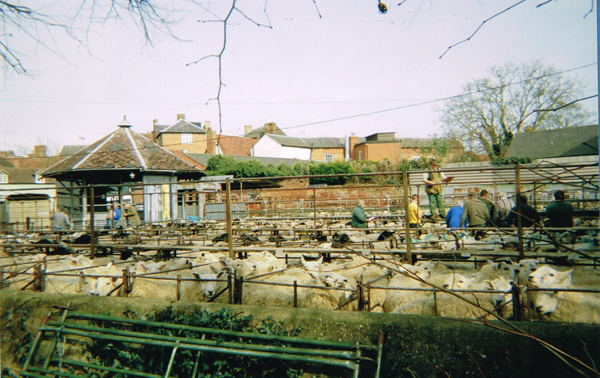
The Christmas Fatstock Show has been held on the Market Square since 2014, when the photo below was taken by Terry Foley.
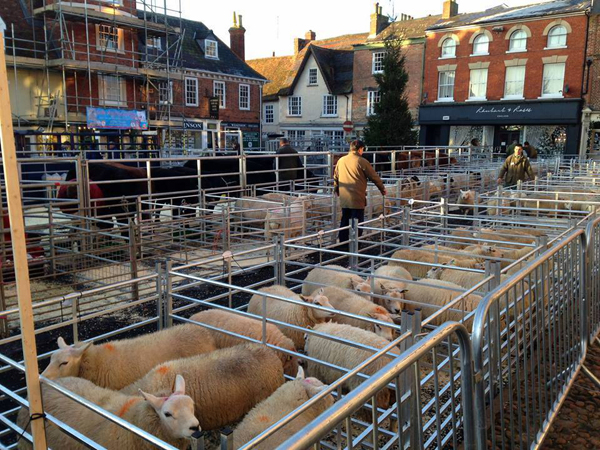
See also: Market Square
